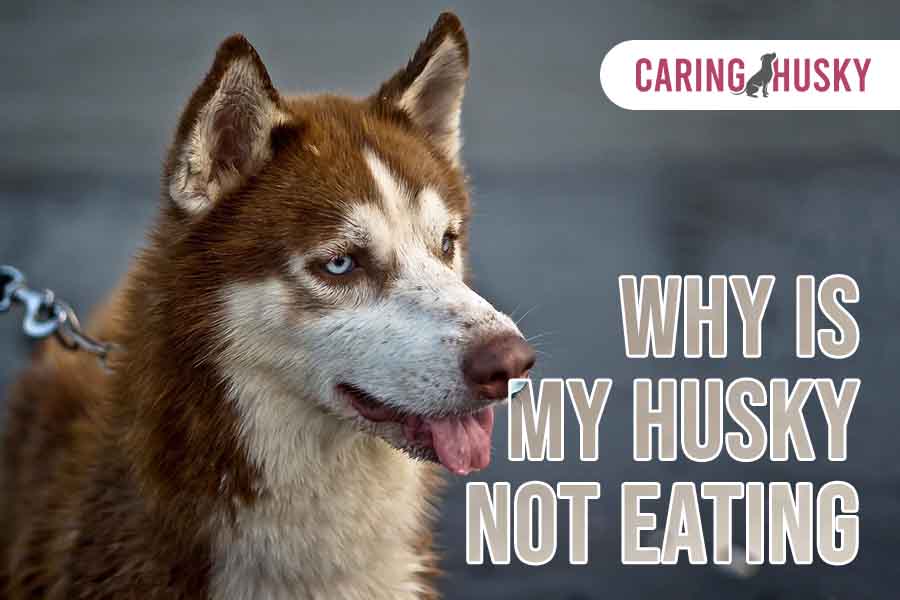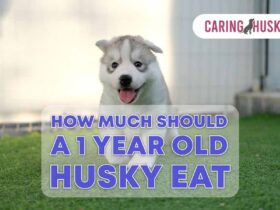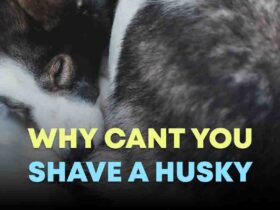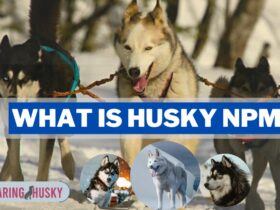A breed renowned for its remarkable energy and unique dietary needs, the sudden loss of appetite can be a puzzling and concerning issue for owners. These majestic canines, known for their wolf-like appearance and spirited demeanor, require a balanced and nutritious diet to maintain their health and vitality. However, when a husky refuses to eat, it raises immediate concerns. This article delves into the myriad reasons a husky might not eat, from health-related issues to behavioral quirks. By understanding the nuances of their eating habits and identifying potential causes, husky owners can take proactive steps to ensure their furry companion remains healthy and happy.
Why is my husky not eating?
It’s not uncommon for huskies to occasionally skip meals, but if your husky is consistently not eating, it’s important to consider several factors. Huskies are known for their unique eating habits and can be more prone to pickiness compared to other breeds. However, loss of appetite could also indicate health issues like dental problems, digestive discomfort, or more severe conditions. Stress and environmental changes can also impact their eating behavior. Ensure their diet is well-balanced and appealing, and if the issue persists, it’s wise to consult a veterinarian to rule out any underlying health concerns.
What Are The Common Reasons Why Huskies May Not Eat?
Dental Problems: Dental issues frequently cause decreased food intake in huskies. These problems can include broken teeth, gum infections, or periodontal disease. When huskies experience pain or discomfort while eating, they may avoid their food.
Gastrointestinal Issues: Various gastrointestinal problems can lead to a husky’s reluctance to eat. Conditions like gastritis (inflammation of the stomach lining) or inflammatory bowel disease can result in digestive discomfort and a decreased appetite.
Parasites: Intestinal parasites, such as worms (e.g., roundworms, tapeworms), can disrupt a husky’s gastrointestinal system. These parasites can cause discomfort, diarrhea, and general malaise, leading to a decreased desire to eat.
Serious Illnesses: Underlying health conditions, such as kidney disease, liver disease, diabetes, or cancer, can significantly impact a husky’s appetite. These conditions may lead to systemic changes that affect metabolism and appetite regulation.
Stress and Anxiety: Huskies are known for their emotional and physical sensitivity. Any significant stressors, changes in their environment, or emotional distress can lead to decreased appetite. Events like moving to a new home, the introduction of a new pet, or separation anxiety can trigger this response.
Picky Eating Habits: Some huskies develop selective eating habits. They may become attached to a particular type or brand of food and refuse to eat anything else. This can be frustrating for owners, but avoiding reinforcing this behavior with constant diet changes is essential.
Overfeeding: Overfeeding or providing excessive treats and snacks can lead to a husky feeling full and uninterested in regular meals. Maintaining a consistent feeding schedule and portion control is essential to prevent overfeeding.
Inadequate Diet Quality: The quality and nutritional content of the food you provide your husky play a significant role in their eating habits. Low-quality or unappetizing food may result in a lack of enthusiasm for mealtime.
Food Allergies or Sensitivities: Like any breed, Huskies can develop food allergies or sensitivities to certain ingredients in their diet. Allergic reactions or gastrointestinal discomfort can discourage them from eating.
Age-Related Dietary Needs: As huskies age, their nutritional requirements may change. Older huskies may have different dietary needs than younger ones. It’s crucial to adjust their diet to accommodate these changes.
Regular Eating Patterns In Huskies
Like many other dog breeds, Huskies tend to have regular eating patterns, but it’s important to note that individual Huskies may have slight variations in their eating habits. Here’s an overview of regular eating patterns in huskies:
- Meal Frequency: Huskies typically have two main meals daily, one in the morning and one in the evening. This feeding schedule helps maintain their energy levels and provides the necessary nutrients.
- Portion Sizes: The portion sizes for huskies can vary based on age, activity level, and overall health. Younger and more active huskies may require more significant portions, while older or less active ones may need smaller portions to prevent overfeeding.
- Consistency: Huskies thrive on a consistent feeding routine. Feeding them at the exact times each day and maintaining a regular schedule is essential. This consistency helps prevent digestive issues and reinforces their understanding of mealtime.
- Water Availability: Access to fresh and clean water should always be available. Hydration is crucial for huskies, especially in warmer weather or after physical activity.
- Avoiding Free-Feeding: Unlike some breeds, huskies are not typically free-fed, where food is left out for them to eat at their leisure. Maintaining control over their portions and feeding times is important to monitor their intake and prevent overeating.
- Monitoring Treats: Huskies love treats, but it’s important to be mindful of treat consumption. Excessive treats can lead to weight gain and decreased appetite during regular meals.
- Transitioning to Adult Food: As puppies, huskies may require more frequent feeding, typically three meals daily. As they grow and mature, they can transition to the standard two-meal schedule for adult dogs.
- Sensitivity to Food Changes: Huskies can be sensitive to sudden changes in their diet. If you need to switch their food, it’s best to do so gradually over several days by mixing the new food with the old one.
- Food Selection: Choosing a high-quality dog food that meets their nutritional needs is essential. Consult with your veterinarian to determine the best diet for your husky based on their age, activity level, and any specific health considerations.
- Appetite Variations: It’s normal for huskies to have occasional variations in their appetite. Weather, activity level, and overall health can influence how much they eat daily.
How Do Huskies’ Eating Habits Differ From Other Dog Breeds?
Huskies have distinct eating habits that differentiate them from many other dog breeds. These differences are influenced by their unique genetic and behavioral traits. Here’s how huskies’ eating habits often differ from other dog breeds:
Huskies are known for their ability to self-regulate their food intake. Unlike some breeds that may overeat if given the chance, huskies tend to stop eating when satisfied. This makes them less prone to obesity.
Huskies can be picky eaters. They may become attached to a specific type of food and refuse to eat anything else. This pickiness can challenge owners who want to introduce variety into their diet.
Huskies have a strong prey drive due to their history as sled dogs in cold climates. This drive can sometimes cause them to be more interested in hunting or exploring than in their food. They may prioritize activities overeating.
Huskies naturally tend to eat smaller, more frequent meals throughout the day rather than large meals at once. This behavior aligns with their history of needing to maintain energy while pulling sleds over long distances.
Huskies, initially bred for cold climates, exhibit temperature-sensitive eating habits. They may reduce their food intake during hot and cold weather to regulate their body temperature.
Huskies display food caching behavior, a survival instinct from their wild ancestors. This behavior, which involves burying or hiding food for future consumption, can come as a surprise to their human companions
Huskies can occasionally go through short fasting periods, eating very little or even refusing food for a day or two. This behavior is usually only a cause for concern if it persists.
What Are The Treatments And Solutions For Not Eating?
The treatment and solutions for a husky’s loss of appetite depend on the underlying cause. Identifying the reason behind their reluctance to eat is crucial before implementing any specific treatment. Here are various treatments and solutions for addressing a husky’s not eating:
Consult a Veterinarian:
Consult a veterinarian if your husky consistently refuses to eat or shows other concerning symptoms. A professional diagnosis is essential to rule out any underlying health issues.
Dental Care:
If dental problems are the cause, your veterinarian may recommend dental treatment, such as teeth cleaning, extractions, or treatment for gum infections, to alleviate pain and discomfort.
Gastrointestinal Treatment:
For gastrointestinal issues, treatment may include medications to reduce inflammation, antibiotics for infections, or dietary adjustments to soothe the stomach.
Parasite Control:
If parasites are the culprit, deworming medications prescribed by a veterinarian can eliminate the parasites and restore your husky’s appetite.
Medical Treatment:
For severe illnesses like kidney disease or cancer, your veterinarian will develop a treatment plan tailored to your husky’s specific condition. This may include medications, dietary changes, or even surgery.
Dietary Adjustments:
Ensure you feed your husky a high-quality, balanced diet appropriate for their age and activity level. Some huskies may have food allergies or sensitivities, so consider switching to a different type of food if needed.
Behavioral Strategies:
If stress or anxiety is the cause, create a calm and stress-free eating environment. Stick to a consistent feeding routine and use positive reinforcement to associate mealtime with a positive experience.
Conclusion
If your husky is not eating, it’s crucial to address the underlying cause, ranging from health issues to behavioral factors. Consult a veterinarian for a proper diagnosis and treatment plan. Maintaining a consistent feeding routine, providing a high-quality diet, and creating a stress-free eating environment is critical to ensuring your husky’s health and well-being. By understanding and addressing the reasons behind their loss of appetite, you can help your furry companion regain their appetite and maintain their vitality.







Leave a Reply